-
New fabric coating could neutralize chemical weapons, save lives
Chemical weapons are nightmarish. In a millisecond, they can kill hundreds, if not thousands. But, in a new study, scientists report that they have developed a way to adhere a lightweight coating onto fabrics that is capable of neutralizing a subclass of these toxins — those that are delivered through the skin. The life-saving technique could eventually be used to protect soldiers and emergency responders.
-
-
New evidence shows pattern of Assad regime’s use of nerve agents
New evidence supports the conclusion that Syrian government forces have used nerve agents on at least four occasions in recent months: on 4 April 2017, in a chemical attack on Khan Sheikhoun that killed at least ninety-two people, and on three other occasions in December 2016 and March 2017, Human Rights Watch said in a report released yesterday. These attacks are part of a broader pattern of Syrian government forces’ use of chemical weapons. The attacks are widespread and systematic, and in some cases have been directed against the civilian population. As part of the evidence showing these attacks have become widespread and systematic, the detailed 48-page report identifies the three different systems being used by the Assad regime to deliver chemical weapons.
-
-
France: We have proof Assad ordered chemical attack on Khan Sheikhun
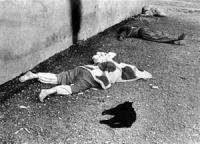
Jean-Marc Ayrault, France’s foreign minister, said Wednesday that France’s intelligence services have evidence that the Syrian government carried out the chemical weapons attack on a Sunni village earlier this month. The Syrian military’s attack on Khan Sheikhun killed eighty-six. British and Turkish scientists, examining injured victims and performing autopsies on those killed, found evidence of both sarin - a nerve gas - and chlorine.
-
-
Syrian defector: Assad still has hundreds of tons of chemical weapons stockpiled
Syrian President Bashar al-Assad circumvented a 2013 deal to dismantle his chemical weapons stockpile by failing to declare the full extent of his arsenal, Syria’s former chemical weapons research chief. Brigadier-General Zaher al-Sakat, who served as the head of chemical warfare in a top Syrian military unit before defecting in 2013, said that Assad had not declared large amounts of sarin and its precursor chemicals.
-
-
Soil-based scrubber turns deadly chemicals into harmless dirt
A DARPA program that is developing a field-deployable system for onsite neutralization of bulk stores of chemical warfare agents (CWA) has successfully demonstrated a novel waterless soil-scrubbing technology that safely neutralized toxic chemicals simulating sarin, soman, and mustard agents. The technology demonstrated greater than 99.9999 percent removal of the simulants, without creating any hazardous waste by-products.
-
-
WH report: The Assad regime's use of chemical weapons on 4 April 2017
The White House on Tuesday released a 4-page report, prepared by the National Security Council, which contains declassified U.S. intelligence on the 4 April chemical weapons attack in Syria. The document calls Russia’s claim that the source of the gas was a rebels’ storage facility a “false narrative,” accusing Russia of “shielding” a client state which has used weapons of mass destruction.
-
-
By insisting Assad must go, the West has prolonged the Syrian conflict

The most enthusiastic Western advocates of removing Assad form a liberal tendency and have been arguing for some form of intervention in Syria ever since the war began in earnest. They are opposed by more realist voices, who exhort them to remember the lessons of Iraq before getting militarily involved. Those on this side point to Syria’s fractured and often radical opposition, the regime’s formidable and battle-hardened forces, and the risks of starting a proxy conflict between the world’s great powers. In combination, these two tendencies have landed United States and United Kingdom foreign policy in an awkward gap between ends and means: Assad must go, but the military means required to remove him are off limits. It feels good to demand that a brutal dictator should no longer be allowed to rule, but insisting on it while failing to back it up with action has helped to prolong unimaginable suffering. Assad is clearly despicable, but the only atrocities worse than those his government has already committed are those yet to come. There are two ways to avert them: either Assad is deposed, probably via U.S.-led military intervention, or some political accord is struck to allow him to stay in exchange for a permanent ceasefire.
-
-
Medical evidence confirms sarin gas was used in Syria chemical attack
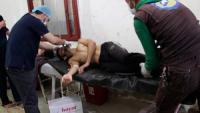
Turkey’s health minister said that traces of sarin gas have been detected in blood and urine samples from victims injured in the town of Khan Sheikhun in Syria on 4 April, offering “concrete evidence” of its use in the attack. Isopropyl methylphosphonic acid, a chemical which sarin degrades into, was found in the blood and urine samples taken from the patients who arrived in Turkey. Many of the victims of last week’s attack were taken to Turkey for treatment because the Assad regime and Russia, as part of their war strategy, have destroyed many of the medical facilities in the Sunni areas of Syria.
-
-
Enzymes versus nerve agents: Designing antidotes for chemical weapons

Nerve agents, a class of synthetic phosphorous-containing compounds, are among the most toxic substances known. Brief exposure to the most potent variants can lead to death within minutes. Once nerve agents enter the body, they irreversibly inhibit a vitally important enzyme called acetylcholinesterase. Its normal job within the nervous system is to help brain and muscle communicate. When a nerve agent shuts down this enzyme, classes of neurons throughout the central and peripheral nervous systems quickly get overstimulated, leading to profuse sweating, convulsions and an excruciating death by asphyxiation. There is a path to mitigate the danger of chemical weapons. This route lies within the domains of science – the very same science that produced chemical weapons in the first place. Researchers in the United States and around the world are developing the tools needed to quickly and safely destroy nerve agents – both in storage facilities and in the human body. There are promising advances, but no enzyme yet exists which is efficient enough for lifesaving use in people. It is worth keeping in mind the awesome and often complex power of science, however: We may be only a few years away from developing the kind of therapeutics that would make chemical weapons a worry of the past.
-
-
The Assad regime’s chemical-weapons kill chain
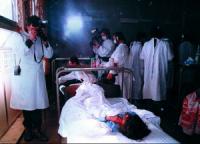
“There’s a long list of Syrian officials with blood on their hands — but the culpability goes all the way to the top,” Gregory Koblentz writes in one of the more important analyses of the Assad regime’s strategic use of chemical weapons (“Syria’s Chemical Weapons Kill Chain,” Foreign Policy, 7 April 2017). Koblentz, the author of Living Weapons: Biological Warfare and International Security, explains that the Syrian chain of command for chemical weapons is composed of four tiers: the senior leadership, which authorizes the use of these weapons and provides strategic guidance; the chemists, who produce, transport, and prepare the chemical weapons for use; the coordinators, who provide intelligence on targets and integrate chemical weapons with conventional military operations; and the triggermen, who deliver the weapons to their targets. “Together, these individuals and organizations form a chemical-weapons kill chain,” Koblentz writes.
-
-
U.S. strikes Syrian airbase from which Assad forces launched sarin gas attack
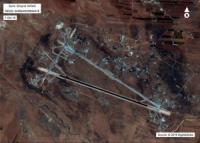
The United States has launched fifty-nine Tomahawk cruise missiles on a Syrian airfield from which Syrian military planes three days ago flew to carry out a sarin gas attack against Sunni civilians in the rebel-held Idlib province. More than eighty people, including thirteen children, were killed in the attack – and in a subsequent attack by the Syrian Air Force which destroyed the hospital to which many of the victims of the gas attack were taken. The cruise missiles were launched from the guided-missile destroyers USS Ross and Porter in the eastern Mediterranean. The United States has had military advisers and specialist on the ground in Syria for a while – it now has about 1,000 soldiers in Syria — advising the anti-regime rebels – especially the Syrian Kurds – but last night cruise missile attack marks the first time the United States has been involved as a combatant in the Syrian conflict.
-
-
Will the U.S. missile strike be the turning point in Syria’s shifting war?

The United States has struck the Syrian airbase used to launch a suspected sarin gas attack against Khan Sheikhun that killed more than eighty civilians. The rebel commander whose district was hit by the suspected chemical weapon attack has said he hopes the strike will be a “turning point” in the war — but the long-running conflict has had many such apparently pivotal moments. A shift of U.S. foreign policy on Syria could have been the game-changer. But the U.S. airstrike is more likely to reinforce the balance of power between the combating factions rather than lead to a turning point.
-
-
Super sponge effectively removes toxins from lakes
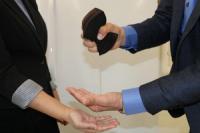
Mercury is very toxic and can cause long-term health damage, but removing it from water is challenging. To address this growing problem. Researchers have created a sponge that can absorb mercury from a polluted water source within seconds. The sponge converts the contamination into a non-toxic complex so it can be disposed of in a landfill after use. The sponge also kills bacterial and fungal microbes.
-
-
Reusable sponge soaks up oil, revolutionizes oil spill, diesel cleanup
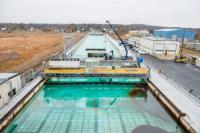
When the Deepwater Horizon drilling pipe blew out seven years ago, beginning the worst oil spill in U.S. history, those in charge of the recovery discovered a new wrinkle: the millions of gallons of oil bubbling from the sea floor weren’t all collecting on the surface where it could be skimmed or burned. Some of it was forming a plume and drifting through the ocean under the surface. Now, scientists have invented a new foam, called Oleo Sponge, that addresses this problem. The material not only easily absorbs oil from water, but is also reusable and can pull dispersed oil from the entire water column—not just the surface.
-
-
At least 58 killed in Syrian army’s chemical attack in rebel-held Idlib province
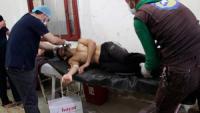
At least fifty-eight people were killed in a chemical attack the Syrian military launched by against a rebel-held Syrian town in Idlib province Tuesday morning. Medics rushed scores of injured civilians to a hospital – but the Syrian air force then bombed the hospital, reducing it to rubble. This is the third reported chemical attack in Syria in just over a week. The previous two were reported in Hama province, in an area not far from Khan Sheikhoun, the site of Tuesday’s attack.
-
- All
- Regional
- Water
- Biometrics
- Borders/Immig
- Business
- Cybersecurity
- Detection
- Disasters
- Government
- Infrastructure
- International
- Public health
- Public Safety
- Communication interoperabillity
- Emergency services
- Emergency medical services
- Fire
- First response
- IEDs
- Law Enforcement
- Law Enforcement Technology
- Military technology
- Nonlethal weapons
- Nuclear weapons
- Personal protection equipment
- Police
- Notification /alert systems
- Situational awareness
- Weapons systems
- Sci-Tech
- Sector Reports
- Surveillance
- Transportation
Advertising & Marketing: advertise@newswirepubs.com
Editorial: editor@newswirepubs.com
General: info@newswirepubs.com
2010-2011 © News Wire Publications, LLC News Wire Publications, LLC
220 Old Country Road | Suite 200 | Mineola | New York | 11501
Permissions and Policies
Editorial: editor@newswirepubs.com
General: info@newswirepubs.com
2010-2011 © News Wire Publications, LLC News Wire Publications, LLC
220 Old Country Road | Suite 200 | Mineola | New York | 11501
Permissions and Policies
